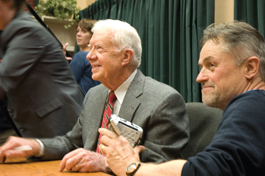home | metro silicon valley index | movies | current reviews | film review

Photograph by Alex Cohen
SIGNING CEREMONY: Jimmy Carter and Jonathan Demme set out on a book tour in 'Jimmy Carter Man From Plains.'
Georgia Rules
Jonathan Demme follows our busiest ex-president on his rounds in 'Jimmy Carter Man From Plains'
By Richard von Busack
ASIDE FROM the fact that it makes you feel like human scum, Jimmy Carter Man From Plains is an inspiring documentary. How does a man of 83 have such energy, you wonder, feeling appendicitislike stabs of remorse over time wasted in dissipation and Halo sessions. Director Jonathan Demme is granted access that probably no president, current or ex, has ever given a filmmaker. Looking over Carter's shoulder, he scurries to keep up with the peppery ex-prez during a multicity book-flogging tour last winter.
For the most part, Carter meets a love fest. Demme's film seems to wonder at a man who can accept all of this praise and thanks without feeling unworthy of it. Fortunately for the dynamic of the film, Carter encounters scorn as well. The worst comes at a large protest rally in Phoenix, where a combination of evangelicals, Jews for Jesus and Israeli pressure groups wait for him.
They, like many commentators, can't get past the title of Carter's book Palestine: Peace Not Apartheid. Carter takes the heat for using that inflammatory word to describe walls, ghettos, identity cards and a separate system of roads in the Occupied Territories. Carter is forced to explain repeatedly that the apartheid in question is not in Israel—"a country universally admired," he says, which is laying it on thick. Rather, he refers to the discrimination in the Occupied Territories in the West Bank and Gaza.
In breaking with his party's policy of going along quietly with the wall builders, Carter is condemned by Nancy Pelosi, John Conyers and Bill Clinton. Some members of the Carter Center resign: 14 out of 224. (As The Nation's Alexander Cockburn noted: "The headlines could be saying, 'Over 90 Percent of Carter Board Members Back Former President.'"
With great patience, Carter suffers himself to be made up for the TV cameras. He meets his opponents, though declining a debate with Alan "The Torture Never Stops" Dershowitz at Brandeis. Thus Dershowitz accuses Carter of "hard-left anti-Israeli zealotry." When an Al Jazeerah interviewer tries to sweeten Carter, the ex-president also comes down with asperity against terror bombers. For recreation during the tour, the spry Nobel laureate wields a hammer in New Orleans for Habitat for Humanity. At night, he keeps up midnight Bible-reading sessions via telephone with his wife back in the small Georgia town of Plains.
In flashbacks, we see Carter's biggest accomplishment, engineering the Camp David accords. At the time, Menachem Begin jested that Carter worked harder than the Jews worked on the pyramids. The then-president closed the deal, we're assured, by passing around photos of his grandchildren to Begin and Sadat.
Live long enough, and you'll see political figures make an entire circuit from demonization to canonization. Hence H.L. Mencken's comment that becoming a monument is a process that all old prostitutes, old buildings and old politicians enjoy. When first elected, Carter seemed like the Spirit of the Bicentennial. On Saturday Night Live, Dan Ackroyd impersonated Carter as a man who could fix anything from a nuclear power plant to a bad LSD trip. His work shirts and Levis, his love of the Allman Brothers, his winning admission that he "lusted after women in his heart" in Playboy magazine made him an alternative to the skullduggery of the Nixon years.
The joke on The Simpsons describing Carter as "History's Greatest Monster!" suggests the rest of the story. Carter's diagnosis of national "malaise"—asking Americans to reduce their energy consumption, indeed!—led to the palmier days of restored innocence in the 1980s. Reagan made America a man again, whilst simultaneously restoring our nation's maidenhead, if this isn't a mixed metaphor and I know it is.
Gilded hindsight shouldn't blind us. Forget Carter's failure to smite Tehran with great vengeance. During his Phoenix stop, for instance, Demme shows Carter being thanked profusely by retired Air Force Col. Thomas E. Schaefer, a former hostage of the Iranians. Carter reiterates that nuking Tehran (as our blood-thirstier commentators wanted, then as now) would have ended up with the hostages dead.
Unfortunately, Demme is so rapt by his subject's energy, charm and humility that he doesn't follow the money. The words "Paul Volcker" or "double-digit prime rate" do not figure in this movie. A director as left-wing as Demme should have included a word about how the labor movement met some cruel defeats under Carter. Then there's the controversy over a sentence in Palestine: Peace Not Apartheid that could be misread to imply that Carter felt terrorism was justified until the apartheid stops. The mea culpa isn't captured during what Demme portrays as a complete forensic triumph over a potentially hostile audience. (Brandeis wouldn't allow Demme to film the preceding speech itself.)
The film illustrates the book, showing the toughness of Carter: "This is the first time I've been called a liar, a bigot and an anti-Semite," Carter says. Demme captures the way Carter gets a bruising for saying what only the Israeli—not the American—media is permitted to say. And in the end Carter just looks like the stronger man for taking it.
![]() JIMMY CARTER MAN FROM PLAINS (PG; 126 min.), a documentary by Jonathan Demme, opens Nov. 2 at selected theaters.
JIMMY CARTER MAN FROM PLAINS (PG; 126 min.), a documentary by Jonathan Demme, opens Nov. 2 at selected theaters.
Send a letter to the editor about this story.
|
|
|
|
|
|